Metro Vancouver’s glut of unused office space is causing cities to look at uses such as pods, hotel rooms and hotel suites as a way to supplement an acute shortage of hospitality space.
Metro Vancouver’s office space vacancy rate stands at 10.1 per cent with downtown Vancouver at 12.5 per cent based upon Avison Young’s first-quarter results this year.
Between 2020 and year-end 2024, downtown will see four million square feet of new office space supplied, well above the annual average 242,000 sf seen in the last decade.
Tourism bureau Destination Vancouver estimates 20,000 new additional hotel rooms will be needed in Metro Vancouver by 2050, including 10,000 within Vancouver.
COVID increased remote work and office sharing, while it knifed into hotel space.
“Vancouver has been lacking in hotel rooms for years; it was made worse by COVID. Hotels were bought up by BC Housing (to house homeless). Instead of adding rooms, we lost rooms. This will impact conventions and major events such as FIFA world cup,” said Javier Cepeda, managing partner of Kalido Hospitality Group.
Kalido moved on the opportunity to lease and convert unused office space at the Smithe House, a 26-storey downtown Vancouver tower, into 37 hotel suites, which will be available for short term rentals. The residential and office building was completed in 2021 with the lower floors designated as office space.
“There are major challenges,” Cepeda said of office-hotel conversions. “There are financial, structural and engineering challenges” as space is reconfigured.
Cepeda said these conversions are happening in many major cities but in Metro Vancouver it is still a relatively new concept as cities are integrating this usage into their approval process.
Togala Construction carried out Kalido’s $5 million conversion, completing it at the end of July. President Michael McKenna agrees the projects are challenging.
“It takes preplanning up front to do the work,” he said as the office design is modified in terms of floor space and needed services for a suite’s kitchenette and bathroom, living and bedroom areas.
The company worked with GBL Architects.
Togala is currently doing a second building for Kalido, the Keefer, another new mixed used building.
Pods, stacked sleeping compartments, are also being proposed as a conversion option to supply needed accommodations for the coming 2025 Invictus Games and FIFA in 2026.
Currently, B.C. has two pod hotels: Whistler’s Pangea Pod Hotel and Richmond’s Panda Pod Hotel.
Vancouver’s building bylaw staff is now exploring the pod option.
The city’s excess office supply has caused many companies to move to newer buildings, leaving older structures empty.
B.C. municipalities administer the B.C. Building Code which permits the change-of-use from existing office to hotel use with only project-based building upgrades for life safety and seismic risk.
Vancouver’s building bylaw uniquely requires cost prohibitive full-building upgrades for the same change-of-use application, according to the Vancouver council motion passed, and it asks for an alignment with other municipalities so pod build-outs can occur.
Stanley Dee of Deecorp Properties Ltd. is ready to go when pod rentals are green-lighted in Vancouver with a building “five steps away” from the Waterfront rapid transit station.
He is proposing a one-floor conversion of unused office space into 80 to 90 pods. Dee said he has been meeting with the city to determine how to integrate the pods into the proposed bylaw changes should they be approved.
The concept of pods as a construction option excites Dee, whose company manages a $300 million portfolio of commercial real estate.
“This is a concept where you sharing and it brings the cost down. It is good for people on a budget and who live near transit downtown,” he said.
He envisions the concept moving into pod living or longer stays, with individuals in smaller spaces sharing amenities in the future.
Metro Vancouver developers are also moving to convert office space.
Thind Properties is awaiting final approval from the City of Burnaby to convert office space in its newly-constructed 48-storey Highline project at Metrotown into a hotel.
The condo-office building, completed in 2023, has 10 floors of office space. The hotel would have 159 hotel units and a ground floor lobby with three existing ground floor retail units merged to accommodate a lounge, concierge, business centre and lobby bar.
Anthem Properties also submitted an application to Burnaby to allow the option of hotel use in the lower floors of its 66-storey Citizen residential tower.
The Lark Group is asking the City of Surrey for an amendment to the comprehensive development zoning bylaw to allow a hotel with 230 units to occupy floors 14 to 23 at its 23-stoery City Centre 4 mixed-use office tower. The building is expected to be complete in the fourth quarter of 2025.
The proposal to convert proposed office floor space to hotel space in the Lark application is a first for Surrey although office-to-residential conversions have occurred, said Amy Jugpal, communications lead, via email.
“It is important to note that these conversations are not of built floor space, but rather of buildings that are still in the planning stages.”


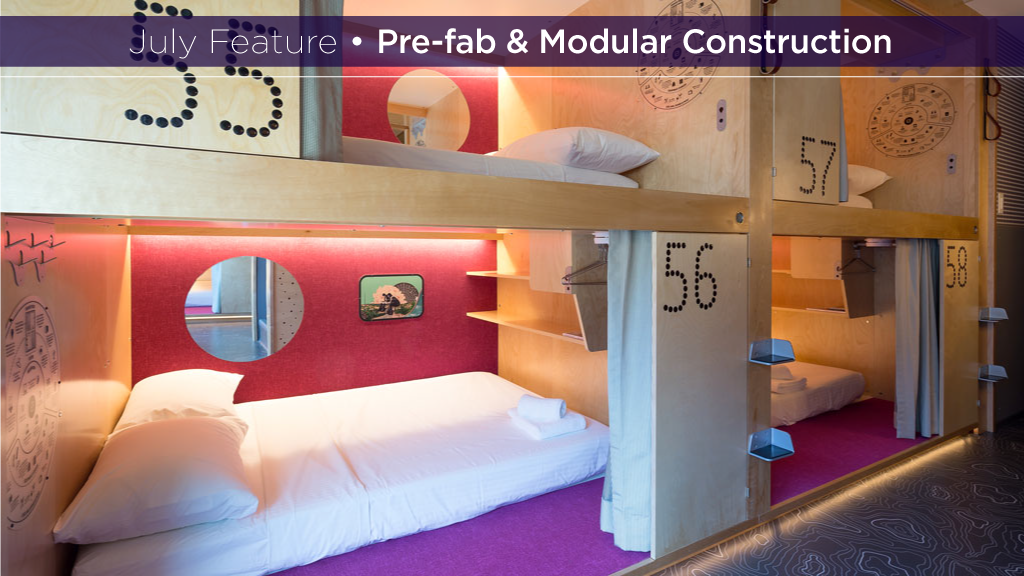
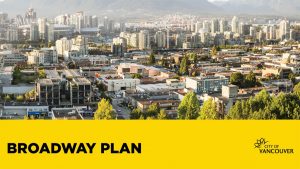
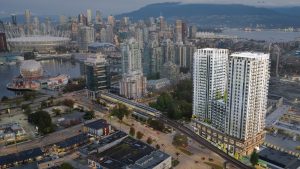


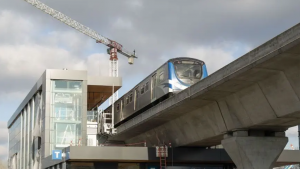
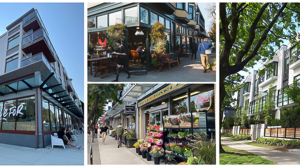
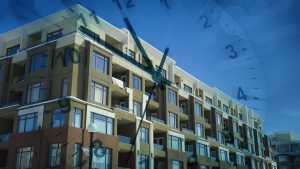
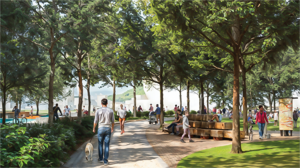
Recent Comments
comments for this post are closed